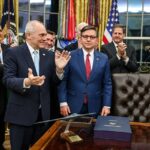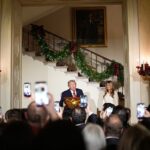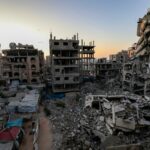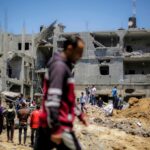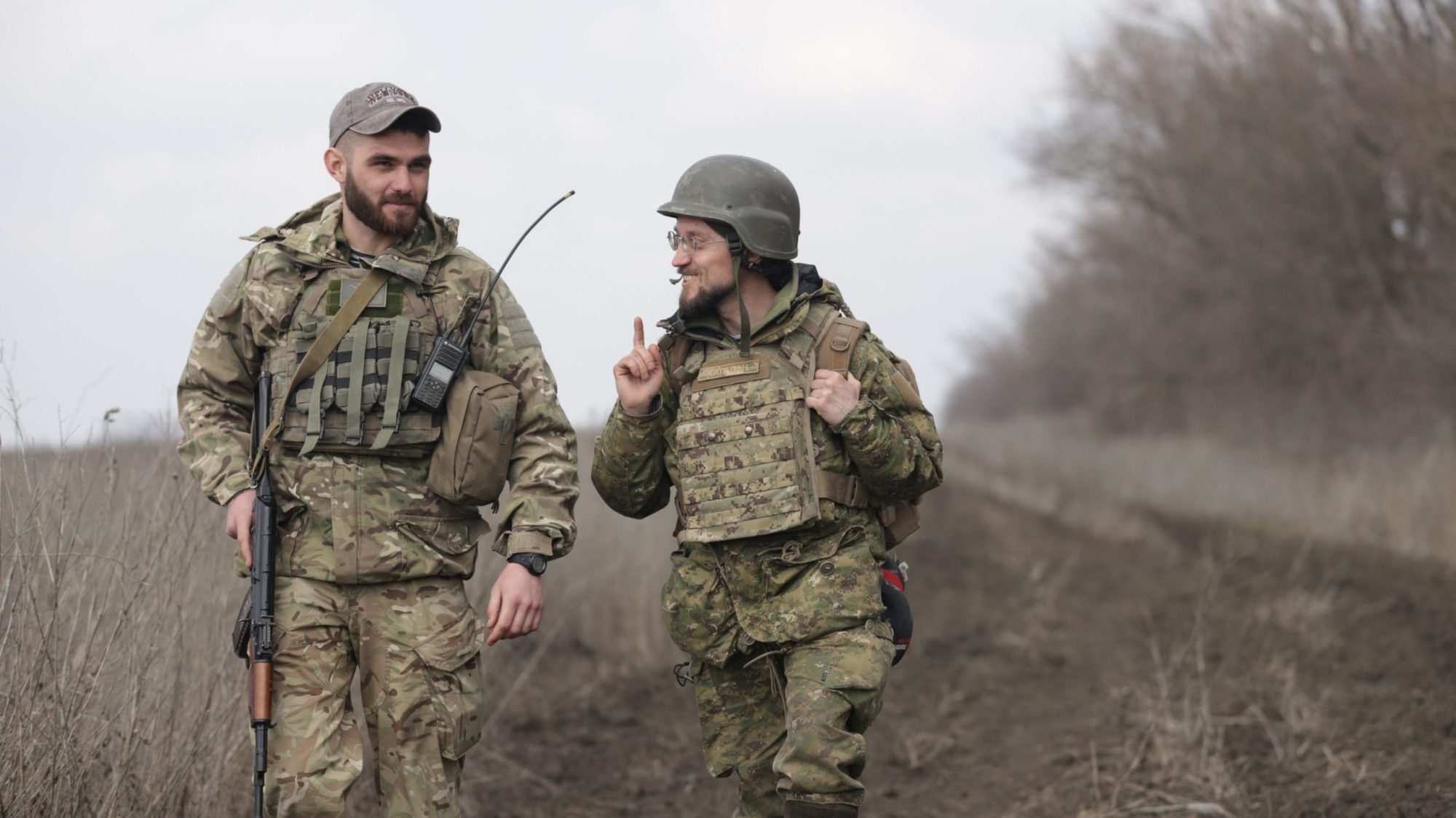They cannot bear arms, but they are an essential part of the Armed Forces: these are Ukraine’s military chaplains. After volunteering for years in the East of Ukraine, they finally have been granted official recognition. In March, Ukraine passed a law that legalizes the work of military chaplains and makes them officers. This means that the chaplains are now contracted by the state and are members of the army.
“This law is a way to decommunize our institutions so the state serves people’s needs,” said Father Andriy Zelinskyy, “This is a very democratic tradition based on Ukraine’s constitution.”
Zelinskyy is among those who worked on the law. He is a military chaplain and the Deputy Head of the Military Chaplaincy Department of the Patriarchal Curia of the Ukrainian Greek Catholic Church. In his job, he oversees 40 full-time chaplains and more than 100 volunteer priests who regularly travel to the front line. In addition, Zelinskyy is the head of the Supervisory board of “The Ukrainian Veterans’ Fund,” which helps soldiers and their families.
“Before this law, military chaplains were volunteers, which meant that nobody had any responsibility for their lives,” Zelinskyy said, “So if chaplains were wounded, army personnel was not required to help them. These issues needed a legal solution.”
Zelinskyy is speaking from his own experience: he was ministering to the soldiers since 2006. In 2014, when the war in Donbas started, he became the first military chaplain in the anti-terrorist operation zone. With the 36th Separate Marine Brigade, Zelinskyy ministered in all the hot spots including Mariupol, Shyrokine, Pavlopil, and Donetsk. Some of these areas have been nearly wiped out by Russians in their 2022 invasion.
“Now, Ukrainian society understands what a military chaplain is,” he said, “But back in 2014, very few knew what it meant.”
Making Chaplains Official
As chaplains were volunteers at that time, they had more freedom in moving in and out of military hot spots. However, it also meant that they were unprotected and did not have any official status or salary. Some chaplains were hired as accountants or other positions just so they could stay with one military unit and provide spiritual services to them.
“Ukrainian society is post-Soviet, so many decision makers had a hard time understanding how religious institutions could be present in the army,” Zelinskyy said, “This is funny because the church is part of the civil society. The state serves people’s needs, so if people think that faith is important to them, then the state has to create the conditions to exercise that need.”
The expert is referring to international practices given that in many democratic and secular states military chaplaincy has already existed for centuries. The new Ukrainian law follows these traditions as well as meets NATO standards.
The law introduces a special chaplaincy service within the Ministry of Defense, which surveys military personnel to determine their religious affiliation. The service then creates a number of mandates that are distributed between different religious organizations according to the number of soldiers that belong to them. This is when the churches and other spiritual institutions step in. They seek volunteers within their own organizations and prepare them spiritually. Later, these volunteers sign a contract with the Ministry of Defense and become members of the military chaplaincy. Finally, the service leadership assigns chaplains to specific units.
This, according to Zelinskyy, profoundly changes the way chaplains work.
“We experience a transformation because we are getting a new institute in our country, a new profession,” the expert said, “All of this requires time. Sadly, the implementation of the law is taking place during Russia’s full-scale invasion. The war is not the best context to initiate new institutes, but it can also be a possibility to find new people.” In his church, the priority is to work with seminary students so they would consider becoming chaplains in the future.
“It is important to differentiate between our global concept of military chaplaincy from the Russian one,” Zelinskyy continued, “In Russia, chaplaincy began much earlier than in Ukraine, but there, it turned into an institute of political propaganda. This is a dangerous practice because the chaplain should only serve the well-being of the soldiers and their spiritual and religious needs.”
“We are talking about a personal calling, and it is a very beautiful one. On the front line, there is always a human being, and you can feel like a defender of that humanity. You are also a warrior, but you’re armed with love for those you serve.”
He warns not to think of chaplains as some party influencers or pro-government manipulators. Rather, chaplains are there to help soldiers heal spiritually and return from the war better men and women.
“The main job of the military chaplain is saving humanity of our warriors,” he added, “Victory for us is not just kicking out the aggressor from our land, but also creating a society where a person feels one’s own freedom and dignity, and where a human being remains a human being.”
A Chaplain’s Work
“Worship is just a small part of our duties,” the priest went on. It is one out of the four work areas of the military chaplains, and the only one that is provided based on the religious affiliation of the soldiers. For example, Christian chaplains have to find and bring imams to perform rituals for Muslim soldiers as they cannot perform them. Other tasks are universal and apply to all the military regardless of their faith.
“A military chaplain has to focus on ethical and educational activities,” Zelinskyy explained, “For instance, when we observe the violence of the Russian soldiers in Ukraine’s occupied territories, we understand that their humanity is in danger. Ukrainian soldiers are different. We have values, and we approach military duties in a civilized way.”
Chaplains are also building bridges between the military and the civil society as well as taking care of the families of the veterans. And finally, chaplains consult the army leadership on topics related to religion and spiritual well-being in the unit.
“Not everyone can be a military chaplain. It is a difficult service, and it requires mobility and a full-time commitment to the unit because you have to grow with it,” Zelinskyy said, “We are talking about a personal calling, and it is a very beautiful one. On the front line, there is always a human being, and you can feel like a defender of that humanity. You are also a warrior, but you’re armed with love for those you serve.”
“It is crucial to observe the beauty when you are on the front line: to feel the sunrise after the shelling or to enjoy a cup of coffee when you can,” he continued, “The pain, violence, and hatred make us defend ourselves, rejecting these feelings and paralyzing our humanity. I know what it is like to be a chaplain in a unit where there is a constant loss of human life. As a chaplain, you live among soldiers, and then, they are gone, and they take a part of you with them. It is a very painful experience.”
Zelinskyy said it is crucial to recognize this vulnerability. In his church, priests meet at an annual gathering for military chaplains where they also talk with experts in psychology. Chaplains attend pilgrimages together and seek support from each other and the church leadership.
“We live in a society with a strong demand for religion, and extreme stress and war only strengthen this,” the expert added, “I am surprised it took such a long time to come up with the institute of chaplaincy in Ukraine because it is very natural for our mentality. I believe that the Ukrainian army will always have a space for the human, so it will always need someone to protect that humanity.”
There are at least 100 military chaplains serving in Ukraine’s Armed Forces although the number might be much higher because it does not include volunteers and those who joined recently. At least three chaplains have been killed on the front line at the time of this writing.


